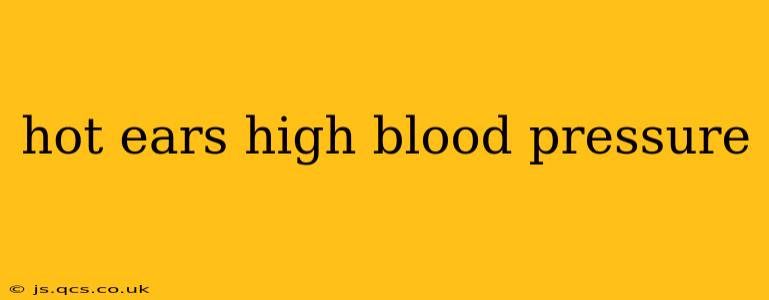Feeling your ears burning up? While a sudden flush in your ears can be attributed to various factors, some individuals wonder if it's linked to their high blood pressure. Let's explore the relationship between hot ears and high blood pressure, separating fact from fiction.
It's crucial to understand that hot ears themselves are not a direct indicator of high blood pressure. High blood pressure, or hypertension, is a condition where the force of blood against your artery walls is consistently too high. This is a serious health concern that requires medical attention. The symptoms of high blood pressure are often subtle and may not be noticeable at all.
However, certain factors associated with high blood pressure can indirectly lead to hot ears. Let's delve into those possibilities.
What Causes Hot Ears?
Before connecting hot ears to high blood pressure, it's important to understand the common causes of this sensation:
-
Changes in Body Temperature: This is the most frequent cause. External heat, exercise, fever, or even menopause can trigger vasodilation (widening of blood vessels), leading to increased blood flow to the ears and a feeling of warmth.
-
Stress and Anxiety: Stress hormones can cause blood vessels to dilate, resulting in hot ears and even flushing in the face. Chronic stress can contribute to high blood pressure, but hot ears aren't a symptom of the stress itself.
-
Alcohol Consumption: Alcohol can cause vasodilation, leading to a warming sensation in the ears and other parts of the body.
-
Spicy Food: Capsaicin, the compound that makes chili peppers spicy, can trigger the same effect.
-
Medications: Some medications can have vasodilation as a side effect.
-
Underlying Medical Conditions: In rare cases, hot ears could be a symptom of an underlying medical condition like rosacea or a hormonal imbalance.
Can High Blood Pressure Cause Hot Ears?
While not a direct symptom, high blood pressure can be indirectly related to hot ears through underlying factors. For example:
-
Menopause: Hormonal changes during menopause are associated with both hot flashes (including hot ears) and an increased risk of high blood pressure. However, the hot flashes are due to hormonal changes, not the high blood pressure itself.
-
Stress: As mentioned earlier, stress is a risk factor for both high blood pressure and hot ears, since it can trigger vasodilation.
Is There a Connection Between Hot Ears and High Blood Pressure?
The connection is indirect and not causal. While both can be triggered by similar factors like stress or hormonal changes, hot ears don't indicate the presence or absence of high blood pressure.
What are the Symptoms of High Blood Pressure?
It's vital to understand that high blood pressure often has no noticeable symptoms. Regular check-ups are crucial for early detection. However, some potential indicators might include:
- Severe Headaches: Persistent or intense headaches.
- Shortness of Breath: Difficulty breathing, even during light activity.
- Nosebleeds: Frequent or severe nosebleeds.
- Dizziness: Feeling lightheaded or faint.
- Fatigue: Unexplained tiredness or lack of energy.
These symptoms do not guarantee high blood pressure but warrant a visit to a healthcare provider.
How is High Blood Pressure Diagnosed?
High blood pressure is diagnosed through a simple blood pressure reading using a sphygmomanometer. Your doctor will likely recommend repeated measurements to ensure accuracy.
How is High Blood Pressure Treated?
Treatment for high blood pressure can include lifestyle changes such as diet modification (DASH diet), regular exercise, stress management, and in some cases, medication.
When Should I See a Doctor About Hot Ears?
While hot ears are usually harmless, you should consult your doctor if:
- Hot ears are accompanied by other concerning symptoms like severe headaches, dizziness, or shortness of breath.
- Hot ears are persistent and unexplained.
- You have a family history of high blood pressure or other cardiovascular conditions.
Disclaimer: This information is for educational purposes only and should not be considered medical advice. Always consult with your healthcare provider for any concerns about your health, including high blood pressure. Self-diagnosing can be dangerous.
